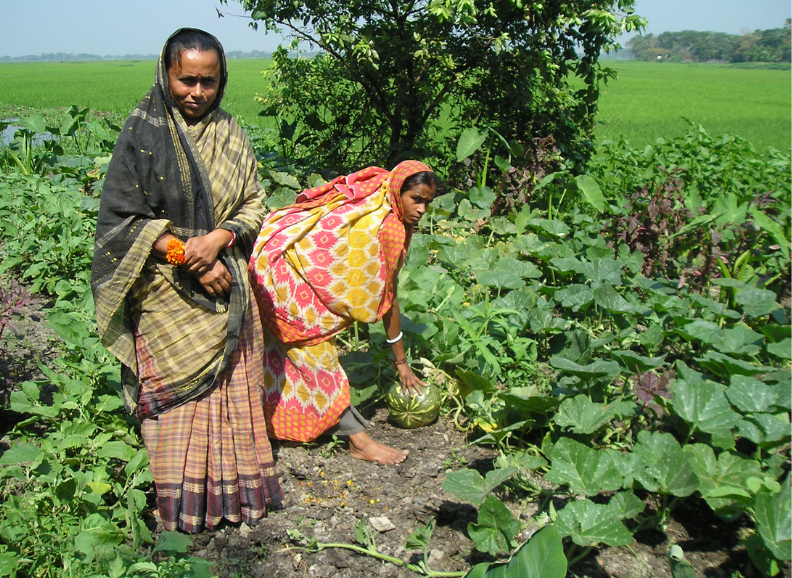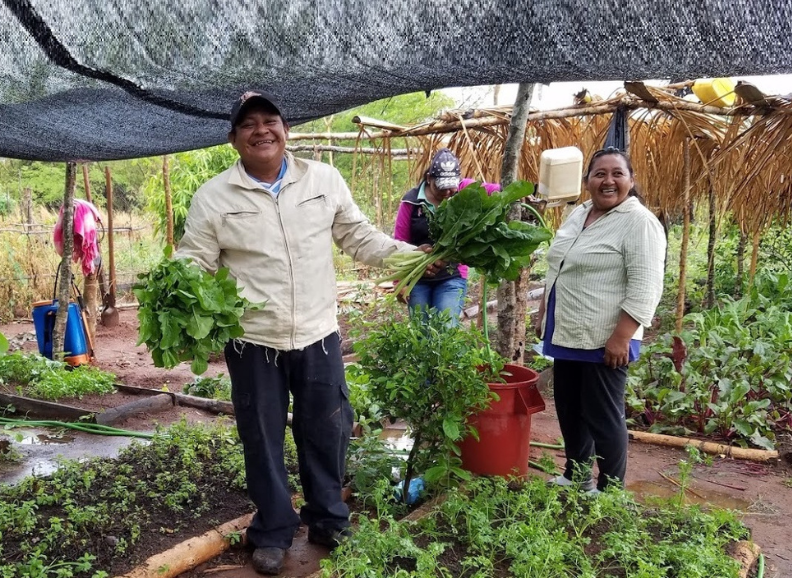Water is life, water is food: World Food Day 2023
"Water is life, water is food" is this year's theme for World Food Day. Our partners around the world know all too well that this is a very true sentence. To celebrate World Food Day 2023 this October 16th, we'd like to show a few examples of how our partners fight for the right to water and this way, contribute to local food sovereignty at the same time.
Below you find the links to three stories from our partner network:
Food sovereignty in the polders of Southwest Bangladesh

A growing movement for agroecology in the South-American La Plata Basin

Agroecology in Kenya: fighting water pollution while securing food production

Read more about this subject
-
 Dossier /
Dossier /Inclusive ways to sustainable and healthy food for all
All around the world small-scale farmers are using sustainable and inclusive methods to produce food. Working together with nature and each other, they provide their families and communities with sufficient and healthy food. But their production methods are under pressure from large-scale agriculture and the globally dominant system of industrial food production. Together with our partners, Both ENDS is trying to turn the tide in favour of sustainable, local practices that are mostly known as 'agro-ecological' or 'nature-inclusive'. Why are we focusing on these methods? Agro-ecological practices are climate-proof and inclusive and increase the opportunities for communities around the world to produce their food sustainably.
-
 News / 30 september 2021
News / 30 september 2021Agroecology in Kenya: fighting water pollution while securing food production
About 75% of Kenyans earn all or part of their income from the agriculture sector which accounts for 33% of the country's Gross Domestic Product (GDP). However, agricultural productivity has stagnated in recent years. Various factors have contributed to low agricultural productivity, including an overall decline in soil fertility because of the continuous removal of nutrients by crops; poor farming practices; land degradation and overuse/misuse of synthetic fertilizers that acidify the soil. The solution against these problems is: agroecology.
-
 News / 19 augustus 2021
News / 19 augustus 2021Violet Matiru: “Communities around colonial Ruiru I Dam still struggle”
After many years of advocating for strong environmental policies at international platforms such as the UN, Kenyan Violet Matiru asked herself: "How does all this lobbying trickle down to our communities? How does this help our mothers who are still struggling with fetching water and cooking on wood stoves?" This is when she and her colleagues founded MCDI Kenya (Millennium Community Development Initiatives) and started to work with local communities. We talked to her about the historical and current power imbalance in water governance and her efforts to improve water governance in the Athi River basin, that runs all the way from upstream of Nairobi, through the city, into the Indian Ocean.
-
 News / 27 september 2021
News / 27 september 2021Analog Forestry: sustainable food production with a feminist perspective
In times of ecosystem degradation, deforestation and climate change, rural communities often struggle to make a living in a healthy and autonomous way. One of the solutions to counter their problems is Analog Forestry, a sustainable practice promoted by many of Both ENDS's partners. We spoke to Carolina Sorzano Lopez*, Analog Forestry trainer from Colombia for the International Analog Forestry Network (IAFN), and Luz Marina Valle*, a local Analog Forestry promotora in her community of El Jocote in Northern Nicaragua, to explain to us the advantages of Analog Forestry.
-
 News / 7 april 2025
News / 7 april 2025Food forest Ketelbroek: where food production and biodiversity come together
When Both ENDS-colleagues visit partners, they often go on a "field trip" to see how our joint work affects people and communities. This year, we did the same in the Netherlands. Food forestry pioneer Wouter van Eck demonstrates a group of Both ENDS partners how regenerative agriculture can offer solutions to the climate and biodiversity crises.
-
 Transformative Practice /
Transformative Practice /Agroecology
Agroecology is a diverse set of agricultural practices, a field of science and a social movement. It aims to transform food systems towards greater ecological sustainability, social justice, and resilience. Both ENDS and CSO-partners around the world support farmers and pastoralists practising agroecology, both on the ground and in gathering political and financial support.
-
 Blog / 12 oktober 2022
Blog / 12 oktober 2022Op-ed in Trouw: "Give more money to local sustainable food producers in developing countries"
The Dutch government and Dutch businesses spend a lot of money on food production in developing countries. But, according to Karin van Boxtel, policy officer at Both ENDS, far too little of that money finds its way to sustainable, nature-inclusive producers.
-
 News / 17 september 2021
News / 17 september 2021Beyond trees: the importance of Non-Timber Forest Products for communities
About one in every six people, particularly women, directly rely on forests for their lives and livelihoods, especially for food. This shows how important non-timber forest products (NTFPs) and forests are to ensure community resilience. Not only as a source of food, water and income, but also because of their cultural and spiritual meaning.
-
 Transformative Practice /
Transformative Practice /A Negotiated Approach for Inclusive Water Governance
A Negotiated Approach envisages the meaningful and long-term participation of communities in all aspects of managing the water and other natural resources on which their lives depend. It seeks to achieve healthy ecosystems and equitable sharing of benefits among all stakeholders within a river basin. This inclusive way of working is an essential precondition for the Transformative Practices that are promoted by Both ENDS and partners.
-
 News / 5 juni 2024
News / 5 juni 2024Appeal by 70 parties: The Netherlands’ strategy for global food security works!
A broad coalition of Dutch companies, knowledge institutes and civil society organizations wants to work together with the new government to make a real difference in improving global food security. The main focus will lie on supporting farmers and consumers in the Netherlands and beyond, and promoting climate-proof food systems in low- and middle-income countries. The coalition believes that, with our knowledge, expertise, experience and reputation for international cooperation and trade, the Netherlands must adopt an ambitious strategy for making our food systems more sustainable, and so contribute to achieving the targets in the Paris Climate Accord and the Sustainable Development Goals.
-
 Dossier /
Dossier /Finance for agroecology
The lion's share of public budgets for climate, agriculture and development still goes to conventional agroindustrial projects that contribute to the current climate, food and biodiversity crises. Both ENDS and our partners are calling for a transition to agroecological practices that are people- and environment-friendly.
-
 News / 21 maart 2025
News / 21 maart 2025Dutch Royal couple visits Thogoto Forest: a green oasis on the outskirts of Nairobi
This week, King Willem-Alexander and Queen Máxima visited Thogoto Forest as part of their state visit to Kenya. They were able to see the impact of the work of our partner MCDI in the area: a restored forest, clean water and farmers who can earn a living by selling their agro-ecological products.
-
 Blog / 29 augustus 2024
Blog / 29 augustus 2024Local action for resilient wetlands and riparian lands of the Athi river basin in Kenya
and Kyra Pohlan
Communities throughout the Athi river basin rely on healthy and resilient semi-aquatic ecosystems, such as riparian and wetland areas, for their well-being and livelihoods. These habitats have become ever more important for local communities in adapting to the effects of climate change, in particular the more frequent and more extreme periods of drought and flooding. By conserving and re-establishing riparian lands and wetlands, groups from the Athi River Community Network do not only protect their immediate environment but also contribute to the well-being of downstream areas.
-
 Event / 23 augustus 2021, 13:00 - 14:00
Event / 23 augustus 2021, 13:00 - 14:00World Water Week seminar: the politics of water and the choices we can make
What do we mean when we say the 'politics of water'? How are the distribution of water and the access to water influenced by political-economic interests? And who has the power to reverse the flow and change tides?
-
 Video / 8 november 2019
Video / 8 november 2019Athi River Community Network
The Athi River Community Network is made up of communities who live along the Athi River watershed. Members of the Athi River Community Network promised to join forces with the Friends of Ondiri Wetland to ensure that this critical wetland is restored and conserved for the sake of current and future generations.
-
 News / 3 juli 2019
News / 3 juli 2019Kenya: Community Network for a healthy Athi river
Through pollution and water scarcity, communities along the Kenyan Athi River have learnt the hard way that upstream and downstream communities are inevitably connected. In response to indiscriminate impacts on the environment and people's livelihoods, civil society organisations within the Athi River Basin formed the Athi River Community Network (ARCN).
-
 Dossier /
Dossier /The merits of community-based restoration
Globally, the area that is suffering desertification and land degradation is ever expanding. Unsustainable and often large-scale agricultural practices, including the copious use of pesticides and fertilisers, are a major driver of land degradation, aprocess that is further exacerbated by climate change, causing more erratic rainfall patterns, longer periods of drought and unpredictable growing seasons. This is very problematic not only for the hundreds of millions of people who directly depend on land and water for their livelihoods, but also for life on earth as a whole. It is clear that this process must be stopped and reversed, better sooner than later. But how to go about it?
-
 Dossier /
Dossier /Rich Forests
Rich Forests promotes a sustainable and future-proof production system and supports, among other things, the transformation of degraded land into food forests. With this, people provide for their livelihood, increase their income and at the same time restore soil and biodiversity.
-
 Dossier /
Dossier /Participatory Land Use Planning (PLUP)
Participatory Land Use Planning (PLUP) is a rights-based approach ensuring inclusive and gender-responsive land governance, especially for those whose rights to land are not fully acknowledged.
-
 News / 26 januari 2022
News / 26 januari 2022Ondiri shines again during World Wetlands Day
Ondiri wetland in Kenya will host the official national World Wetlands Day
celebration on the 2nd of February. This news was received with much joy by the residents of Kikuyu Town and conservationists. For many years, Ondiri Wetland was
polluted and degraded, especially due to encroachment and greenhouse farming. But thanks to sustained and concerted efforts by the residents together with a broad range of governmental and non-governmental stakeholders, the conservation of this critical wetland is now being secured. Violet Matiru from Kenyan organisation Millennium Community Development Initiatives (MCDI), finds it a great honor that Ondiri was selected for the celebrations. "The cherry on the pie!"


